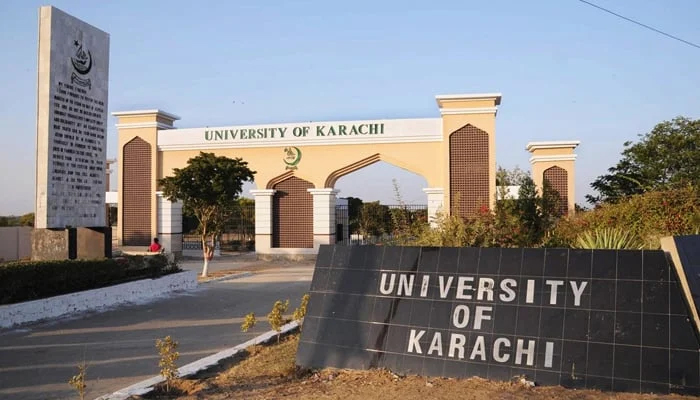BS entrance test results raise questions about meritocracy
The results of the entrance test 2024 for admissions at BS level in 20 departments of the prestigious University of Karachi have sent shock waves through the education sector.
The performance difference between students from public sector education boards has reached new heights, raising questions about the basic foundation of meritocracy and quality despite spending billions of rupees on the education sector.
A closer examination of the statistics reveals a gloomy picture. Students who passed with ‘A-1’ and ‘A’ grades from public sector school boards in Sindh performed poorly on the entrance test, raising serious concerns about the integrity of their merit.
Notably, the Hyderabad board experienced a disastrous failure, with a meagre five per cent success rate, while the private Ziauddin board did no better, with only four per cent of the students passing the entrance exam.
Despite this bleak picture, there were glimmers of hope. The private Aga Khan board and the Cambridge system performed much better, demonstrating a difference in educational quality.
Out of the 8,099 students who took the admission exam, only 21.3 per cent passed, leaving the remaining 78.7 per cent disappointed. As the results from the different boards surfaced, the differences became more apparent.
The pass percentage of the Aga Khan Examination Board’s applicants was 57.69 per cent, compared to 26.47 per cent of the federal board. The Board of Intermediate Education Karachi’s 23.89 per cent success rate reflected the overall trend of underperformance.
The situation was especially grave for several boards, with the Hyderabad, Larkana and Ziauddin boards recording pass rates of 4.85 per cent, 4.98 per cent and 3.5 per cent respectively, portraying a bleak picture of the education scene.
The main reason for this catastrophe can be traced back to the long-standing issue of administrative vacancies that has plagued various education boards. The lack of permanent controllers, chairmen, secretaries and audit officers has fostered arbitrariness and a culture of suggestions, undermining the basic foundation of academic honesty.
A clear example of this administrative inertia is the case of Deputy Controller of Examinations Dr Masroor Ahmed Zai, who has been shouldering the responsibilities of a controller of examinations for a staggering 11 years at the Hyderabad board, which was among those who suffered the worst fate in the entrance test.
-
 Travis Kelce Plays Key Role In Taylor Swift's 'Opalite' Remix
Travis Kelce Plays Key Role In Taylor Swift's 'Opalite' Remix -
 How Jennifer Aniston's 57th Birthday Went With Boyfriend Jim Curtis
How Jennifer Aniston's 57th Birthday Went With Boyfriend Jim Curtis -
 JoJo Siwa Shares Inspiring Words With Young Changemakers
JoJo Siwa Shares Inspiring Words With Young Changemakers -
 James Van Der Beek Loved Ones Breaks Silence After Fundraiser Hits $2.2M
James Van Der Beek Loved Ones Breaks Silence After Fundraiser Hits $2.2M -
 Disney’s $336m 'Snow White' Remake Ends With $170m Box Office Loss: Report
Disney’s $336m 'Snow White' Remake Ends With $170m Box Office Loss: Report -
 Travis Kelce's Mom Donna Kelce Breaks Silence On His Retirement Plans
Travis Kelce's Mom Donna Kelce Breaks Silence On His Retirement Plans -
 Premiere Date Of 'Spider-Noir' Featuring Nicolas Cage Announced
Premiere Date Of 'Spider-Noir' Featuring Nicolas Cage Announced -
 Pedro Pascal's Sister Reveals His Reaction To Her 'The Beauty' Role
Pedro Pascal's Sister Reveals His Reaction To Her 'The Beauty' Role -
 Kate Middleton Proves She's True 'children's Princess' With THIS Move
Kate Middleton Proves She's True 'children's Princess' With THIS Move -
 Paul Anka Reveals How He Raised Son Ethan Differently From His Daughters
Paul Anka Reveals How He Raised Son Ethan Differently From His Daughters -
 'A Very Special Visitor' Meets Queen Camilla At Clarence House
'A Very Special Visitor' Meets Queen Camilla At Clarence House -
 Jodie Turner Smith Shares One Strict Rule She Follows As A Mom
Jodie Turner Smith Shares One Strict Rule She Follows As A Mom -
 Hailey Bieber Reveals KEY To Balancing Motherhood With Career
Hailey Bieber Reveals KEY To Balancing Motherhood With Career -
 Photo Of Jay-Z, Other Prominent Figures With Jeffrey Epstein Proven To Be Fake
Photo Of Jay-Z, Other Prominent Figures With Jeffrey Epstein Proven To Be Fake -
 Hillary Clinton's Munich Train Video Sparks Conspiracy Theories
Hillary Clinton's Munich Train Video Sparks Conspiracy Theories -
 Fans Slam Talk Show Host For 'cringe' Behavior In Chris Hemsworth Interview
Fans Slam Talk Show Host For 'cringe' Behavior In Chris Hemsworth Interview




